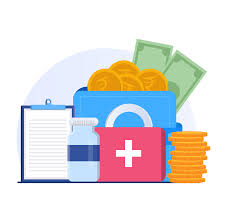Financial security is something that many people strive for, but it can be challenging to achieve without proper planning. One of the most essential aspects of personal finance is having an emergency fund. An emergency fund provides a financial cushion that can help you weather unexpected expenses, protect your savings, and reduce stress during difficult times. In this article, we'll explore why an emergency fund is crucial, how much you should save, and practical tips on how to build one.
What Is an Emergency Fund?
An emergency fund is a savings account specifically set aside to cover unexpected expenses, such as medical emergencies, car repairs, home maintenance, or sudden job loss. Unlike other savings, this fund is not meant for planned purchases or vacations; it’s a financial safety net designed to help you navigate unforeseen financial setbacks without going into debt.
Why Is an Emergency Fund Important?
1. Provides Financial Security
Life is unpredictable, and emergencies can happen when you least expect them. Whether it's a major medical expense or a sudden job loss, having an emergency fund can provide a sense of financial security. It ensures that you can handle these unexpected situations without having to borrow money, dip into your long-term savings, or rely on credit cards, which often come with high-interest rates.
2. Prevents High-Interest Debt
Without an emergency fund, many people turn to credit cards or personal loans to cover sudden expenses. These debts often come with high-interest rates, which can take months or even years to pay off. By having a well-stocked emergency fund, you can avoid the cycle of accumulating debt and paying unnecessary interest charges, ultimately saving money in the long run.
3. Reduces Stress During Emergencies
Financial stress can take a toll on your mental health. Knowing that you have money set aside for emergencies can help reduce anxiety and stress during difficult times. Instead of panicking about how you'll pay for an unexpected bill, you can focus on resolving the issue at hand, knowing that your emergency fund has your back.
4. Helps You Stay on Track with Long-Term Financial Goals
Without an emergency fund, any unexpected expense can derail your long-term financial goals, such as saving for a house, retirement, or a child's education. By having a financial buffer, you can cover emergencies without needing to pause or stop contributions to your long-term savings. This allows you to continue working toward your financial goals uninterrupted.
How Much Should You Save in an Emergency Fund?
The amount you need in an emergency fund varies depending on your lifestyle, income, and financial obligations. However, a general rule of thumb is to save three to six months' worth of living expenses. If you have dependents, a mortgage, or variable income, you might want to aim for a more substantial fund, perhaps closer to six to twelve months of expenses.
Here’s how to calculate it:
- List Your Essential Monthly Expenses: Include rent or mortgage, utilities, groceries, insurance, transportation, and any other necessary costs.
- Multiply by 3, 6, or 12: Depending on your comfort level and financial stability, multiply your total monthly expenses by three, six, or twelve to determine your target emergency fund.
How to Build an Emergency Fund
Building an emergency fund may seem daunting, especially if you're starting from scratch, but with consistent effort and smart financial habits, it's entirely achievable. Here are some practical tips to help you get started:
1. Start Small and Be Consistent
If saving three to six months of expenses feels overwhelming, start with a smaller, more manageable goal, such as $500 or $1,000. Once you reach that milestone, continue building from there. The key is consistency. Set up automatic transfers from your checking account to a high-yield savings account specifically designated for emergencies.
2. Cut Unnecessary Expenses
Look for areas in your budget where you can cut back. This could include dining out less, canceling unused subscriptions, or reducing impulse purchases. Redirect those savings toward your emergency fund. Even small changes can make a big difference over time.
3. Use Windfalls Wisely
Whenever you receive unexpected money, such as a tax refund, bonus, or inheritance, consider putting a portion or all of it into your emergency fund. This can give your savings a significant boost without affecting your regular budget.
4. Sell Unused Items
Another way to grow your emergency fund is by selling items you no longer need. Consider decluttering your home and selling unused clothes, electronics, or furniture online through platforms like eBay, Facebook Marketplace, or Poshmark. The extra cash can help accelerate your savings.
5. Earn Extra Income
If your current income doesn’t allow you to save as much as you’d like, consider finding ways to earn extra money. This could be through a part-time job, freelancing, or starting a side hustle. Dedicate any additional income to your emergency fund until you reach your goal.
When to Use Your Emergency Fund
An emergency fund should only be used for genuine emergencies, such as:
- Job Loss: If you lose your job, your emergency fund can cover living expenses until you find new employment.
- Unexpected Medical Bills: Major medical expenses can quickly become overwhelming, even with insurance. Use your emergency fund to cover any out-of-pocket costs.
- Car or Home Repairs: Unexpected repairs can be costly. Your emergency fund can help cover these expenses without putting you in debt.
Avoid using your emergency fund for non-emergencies like vacations, shopping, or planned purchases. Remember, its primary purpose is to act as a financial safety net.
Conclusion
An emergency fund is an essential tool for financial security and peace of mind. It provides a buffer against unexpected expenses and helps prevent high-interest debt. By starting small, cutting unnecessary costs, and staying consistent with your savings, you can build an emergency fund that will protect you during life’s unexpected moments. Start today and take the first step toward financial independence.









No comments:
Post a Comment